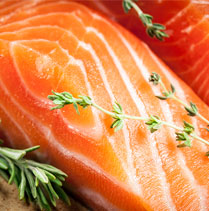
Remember when being pregnant or nursing was a time when the mother or mother-to-be could eat whatever she wanted, without monitoring the frequency or portion size of consumption?
Unfortunately, those days are long gone. The list of foods expecting or nursing moms should avoid or limit seems to be continually growing. The fish and shellfish group is one of the foods included on this list. However, following these healthy guidelines is not as simple as cutting out all food that comes from the sea. Fish and seafood can be an important part of a balanced diet for pregnant women if consumed in a proper manner. It is a good source of high-quality protein and other nutrients while containing healthy fats. The omega-3 fatty acids found in fish and seafood promote healthy vision, central nervous system growth, and brain development in infants whose mothers consume fish or seafood during pregnancy or while nursing. Omega-3s cross the placenta and help build developing brains in fetuses and in infants during the first months of life. These healthy fats also appear to decrease the risk of delivering a preterm, low-birth-weight baby.
If fish and seafood are so healthy, why are expecting or nursing moms advised to monitor her intake of these foods? While fish and seafood provide important nutrients, they, unfortunately, may also contain toxic contaminants, such as mercury, dioxin, and PCBs. For a quick and easy list of what fish to eat and which fish to avoid go-to types of fish to eat and avoid during pregnancy.
Mercury
Mercury occurs naturally in the environment and can be released into the air through industrial pollution. The mercury in the air can contaminate surface water and then be absorbed by fish. Nearly all fish contain trace amounts of mercury; however, certain fish have higher levels of the metal compared with others. Mercury binds to fat, therefore having higher and thus unhealthy concentrations in fatty fish.
Mercury damages many parts of the body, including the nervous system, lungs, kidneys, hearing, and vision. The seriousness of the risk depends upon how much mercury a person is exposed to. Mercury can be transferred from mother to infant through breast milk and through the placenta during intrauterine life. Offspring are therefore subjected to mercury exposure through both the gestation and the breastfeeding periods, however, the risk is especially high during gestation but may decrease during breast-feeding.
Dioxin
Dioxin is a general term that describes a group of hundreds of chemicals that are formed as an unintentional by-product of industrial processes involving chlorine. Exposure to dioxin can cause severe reproductive and developmental problems and has the ability to damage the immune system and interfere with hormonal systems. Dioxin exposure has been linked to many problems, including birth defects and learning disabilities. The major sources of dioxin are in our diet. Since dioxin is fat-soluble, it is more prevalent in fatty fish.
PCBS
Polychlorinated biphenyls (PCBs) are a mixture of individual chemicals, which are no longer produced in the United States but are still found in the environment. PCBs do not readily break down in the environment and thus may remain there for very long periods of time. PCBs are taken up by small organisms and fish in the water. A great deal of concern exists that even low levels of PCBs transferred to the fetus across the placenta may cause long-lasting neurological damage. Since PCBs are fat-soluble, there is also concern that significant amounts might be transferred to nursing infants through breast milk. Studies in humans who consumed large amounts of Great Lakes fish contaminated with chemicals, including PCBs, have shown that PCBs play a role in slight neurobehavioral changes found in newborn children.












